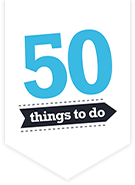Theory of Change | 50 Things To Do Before You're Five
BACK TO OVERVIEW
Vision
For every child to reach important health, learning, and wellbeing milestones through a playfilled childhood.
Mission
To develop place- based, parent and child-facing offers across the United Kingdom, providing 50 low or no cost ideas for play, to children and the people who care for them.
Theoretical Foundations
- Developmental NeuroScience
- Ecological Systems Theory
- NeuroScience of Play
Target Audience
All families with children under 5 years old.
Designed to support opportunities for targeted engagement
Desired Outcomes
- Improve parental confidence in engaging in playful family learning with their child.
- Improve health by establishing active lifestyles
- Increase parental understanding of the importance of language interaction
- Improve school readiness including better self regualtion, metacognition and resilience
Evidence Based Intervention
Presented and packaged through a mobile app, 50 Things to Do Before You’re Five helps parents develop their home learning environment, providing inspiration to connect with their children through a range of activities.
It provides a local offer, guiding them to places to visit, and fun things to do on their doorstep. Supporting them to make best use of their local libraries, museums, parks and wild spaces - helping to promote community cohesion at the same time.
Short Term Impact
- Increased parent /child interaction
- Stronger parent-child bond
- Improved engagement in outdoor play and learning
- Richer language environments
Long Term Impact
- Increased wellbeing and self-efficacy as parents
- Better mental wellbeing, lower obesity, and improved coronary and respiratory fitness.
- Reduced attainment gap
- Improved life chances for young people from disadvantaged communities.
Key Assumptions
- Access to life-changing, fun, low or no-cost experiences with family, indoors and outdoors, is a great way to support children’s development.
- Parents who confidently support the development of language, literacy and communication skills with their under-fives has a profound impact on achievement in primary and secondary age phases
